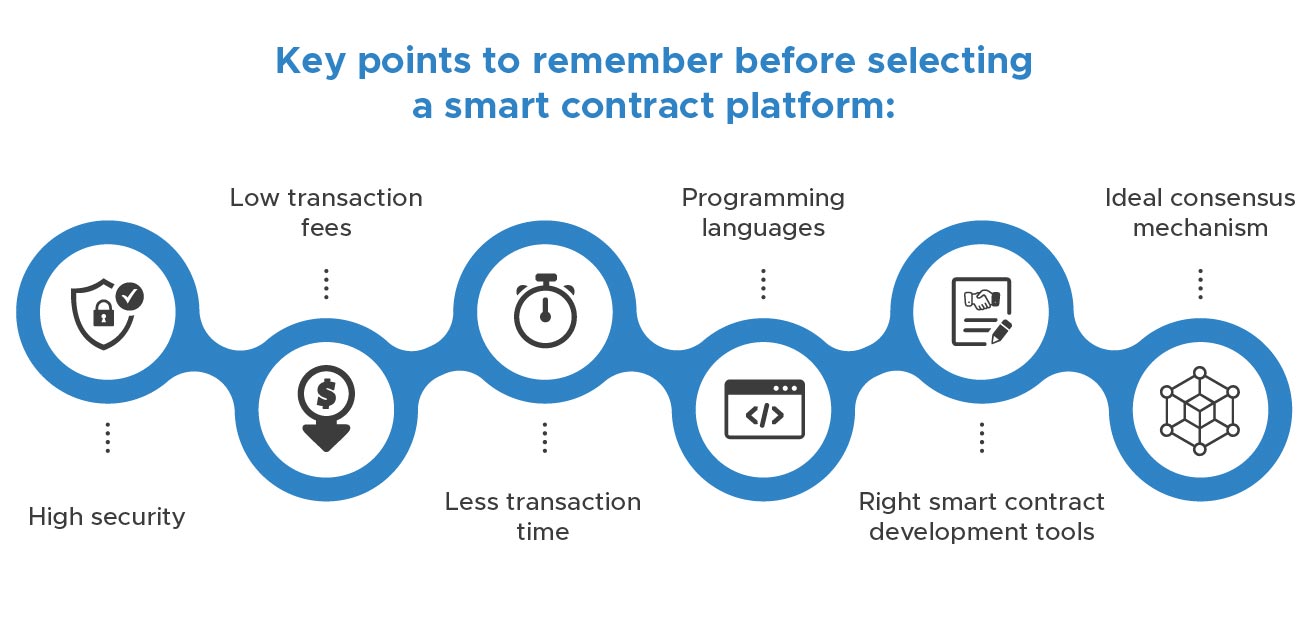-
Blockchain technology is making its way into many industries, from finance to healthcare. This ledger-based technology provides a network of unfiltered and trusted data. One of the most crucial components that aid blockchain technology in facilitating these benefits is a smart contract. A smart contract is a computer program that automatically executes itself on a blockchain. You need to develop a smart contract to smoothen the functioning of a blockchain and the dApps built on it. Moreover, smart contract development requires a blockchain platform. A smart contract-specific platform gives users smart contract programming and testing services. Additionally, it acts as a framework for decentralized application (dApp) development. It is essential to choose the right place to build smart contracts. So, we have curated a list to make it easier for you to opt for one of the best smart contract platforms for your business use case. But first, let us look at the importance of smart contracts.
Smart Contract Importance
The following are the importance of smart contracts in a blockchain:
Decentralization
Smart contracts do not require any middlemen since they can execute automatically, increasing the degree of decentralization.
Speed
Since there is no time spent on an intermediary, smart contracts make the execution process quick.
Security
Once deployed, no one can make any changes to the business logic predefined in a smart contract. On a blockchain the smart contract code becomes immutable, thus, ensuring the security of transactions. Also, Read | A Beginner's Guide to Arbitrum Blockchain Development
Affordable
Smart contracts eliminate the need for any middlemen. So they remove unnecessary costs and make it more affordable for users.
No Human Error
Since these programs do not require any human involvement, there are zero chances of human errors.
Key Points to Know Before Choosing One of the Best Smart Contract Platforms
 Firms need to understand the requirement of their business before searching for one of the top smart contract platforms. You can consider the following points to understand your business needs:
Firms need to understand the requirement of their business before searching for one of the top smart contract platforms. You can consider the following points to understand your business needs:- High security
- Low transaction fees
- Less transaction time
- Programming languages
- Ideal consensus mechanism
- Right smart contract development tools
Top Smart Contract Platforms
There are many smart contract platforms in the market. And Ethereum is among the most popular platform for smart contract development due to its highly decentralized security. It is tried and tested on a blockchain-based platform. So, you can always rely on Ethereum. Apart from Ethereum, there are other smart contract platforms that you must know if you are looking for other functionalities. The following is the list of the most popular smart contract platforms other than Ethereum:
Solana
Solana is an open-source blockchain supporting smart contracts. Anatoly Yakovenko developed this platform in 2017 to address issues faced by the Ethereum platform. Scalability and transaction speed are among these issues. Solana offers the following benefits for smart contract development:
- Consensus Mechanism: Solana uses a unique blend of Proof-of-Stake (PoS) and Proof-of-History (PoH) consensus algorithms. This combination maintains decentralization while simultaneously maintaining secure and faster transactions.
- Transaction Speed: Solana offers a transaction speed of up to 65,000 TPS (transactions per second), which is faster than many smart contract platforms.
- Familiar Programming Languages: Solana uses C++, C, and Rust programming languages for smart contract development. These are commonly known languages, so a developer will not find it challenging to use this platform.
- Ethereum Virtual Machine (EVM) Compatibility: Solana offers EVM compatibility, meaning that you can transfer an Ethereum-developed dApp to this platform.
- Scalability: High transaction speed leads to increased scalability of the platform.
- Tools: Solana provides frameworks and SDK tools for smart contract development.
Avalanche
Avalanche is a layer-1 blockchain platform that has general-purpose smart contract functionality. The platform has AVAX as its native utility coin. The platform's design enables more users to work efficiently on the network. The following are the advantages of using this network:
- Consensus Mechanism: Avalanche uses the Snow consensus mechanism, which utilizes the PoS mechanism as its foundation.
- Transaction Speed: Avalanche can perform up to 4,500 transactions per second.
- Programming Languages: Avalanche uses Solidity for developing smart contracts.
- Tools: The platform uses tools like Remix, Hardhat, Truffle, etc. to write a smart contract.
- EVM Compatibility: Similar to Solana, Avalanche also offers EVM compatibility. So, you can easily migrate a dApp developed in Ethereum to Avalanche.
- Three-chain Subnet Architecture: Avalanche has a three-chain subnet architecture. It includes the Platform Chain (P-Chain), the Exchange Chain (X-Chain), and the Contract Chain (C-Chain). The C-chain focuses on smart contract development. Such an architecture makes Avalanche a secure and flexible platform.
Polkadot
Polkadot is an ecosystem that connects various blockchains. Polkachain consists of a central blockchain (relay chain) and several layer-1 blockchains (parachains). Polkadot offers smart contract functionality due to its parachains (layer-1 blockchains). Polkadot launched an Ethereum-compatible parachain, called Moonbeam, to develop smart contracts. Moonbeam gives the following features:
- Nominated Proof-of-Stake (NPoS): Polkadot uses the NPoS consensus mechanism to ensure transparency in the network.
- Minimum Changes: Moonbeam requires minimal configuration changes so you can deploy a smart contract immediately.
- Common Programming Languages: The platform uses familiar programming languages like solidity, Vyper, and more. So, you don't need to learn a language separately.
- Familiar Tools: The smart contract platform offers tools similar to Ethereum, making it easier for you to adapt to Moonbeam. Examples of tools include Hardhat, MetaMask, Hardhat, Waffle, and Truffle.
- Built-in Integration: Moonbeam offers pre-built integration for Ethereum Request for Comment 20 (ERC-20) or DOT.
Algorand
Algorand is a relatively fast and affordable smart contract platform. Developers can create efficient, secure, and functionally advanced smart contracts on this platform. No one can hamper these trustless programs on the Algorand blockchain. The following are some aspects of Algorand for smart contract development:
- Consensus Mechanism: The smart contract platform uses the Pure Proof of Stake (PPoS) consensus mechanism. It gives users an equal opportunity to become a validator. Consequently, it maintains high security in the network since the list of upcoming validators remains a secret.
- Transaction Speed: Algorand is capable of processing 6,000 TPS.
- Programming Languages: Algorand uses a programming language called Transaction Execution Approval Language (TEAL) for smart contract development. Developers can also write programs in Python and then compile them to TEAL with the PyTeal library.
- Algorand Virtual Machine (AVM): Algorand has AVM that executes smart contract functionality. It provides developers the ability to utilize loops, functions, and recursion.
- Contract-to-Contract Calls: Algorand has a Contract-to-Contract call feature for direct communication. So, smart contract-based dApps can interact among themselves. It increases functionality and usability.
Top Permissioned or Private Smart Contract Platforms
Developers can use the above-mentioned smart contract platforms for public blockchain app development. They can use Avalanche and Polkadot smart contracts for permissioned or private blockchain networks. If you are looking for a private ledger, then you can consider the following list of top permissioned or private smart contract platforms:
Hyperledger Fabric
Hyperledger Fabric is an open-source distributed ledger platform for permissioned smart contract development. A smart contract developed in Hyperledger is called Chaincode. This enterprise-oriented smart contract platform offers the following functionalities:
- Consensus mechanism: Hyperledger Fabric uses Crash Fault Tolerant (CFT) consensus mechanism. This consensus can withstand a certain degree of component failure.
- Transaction speed: Hyperledger gives 20,000 transactions per second at a zero transaction fee.
- Programming languages: Hyperledger uses Go and JavaScript (node. js) programming languages for smart contract development.
- Tools: This platform offers tools like Hyperledger composer for efficient smart contract development.
Also, Explore | OpenZeppelin for Creating Secure Smart Contracts
R3 Corda
R3 Corda is a permissioned or private blockchain platform for smart contract development. It does not have any native currency. The platform offers supervisory and regulatory observer nodes to verify a smart contract. The following are some benefits of this platform:
- Consensus Mechanism: R3 Corda uses transaction validity and transaction uniqueness consensus mechanisms.
- Transaction Speed: R3 Corda gives 20,000 TPS, which results in ensuring scalability.
- Programming Languages: The platform uses Kotlin programming language that offers a high level of integration.
- Business System Integration: R3 Corda provides smart contract integration with many business systems like Azure, Oracle, Java Virtual Machine, etc.
Also, Read: Corda Blockchain: Finding its Applications in the Real World
Conclusion
There is no definitive answer to the question, ‘What is the best platform for smart contracts development?' For instance, if you only need a platform with comprehensive documentation and a powerful tool, you can opt for Ethereum. But if you are searching for fast transactions, then Ethereum would not be an ideal fit for your business. So, it all boils down to your business requirements. Oodles can simplify your search process by developing a smart contract with the right platform according to your demands. Our smart contract developers have extensive experience in smart contract development on platforms like Hyperledger, Solana, Avalanche, and more.

Our Offices
INDIA
Emaar Digital Greens, Sector 61,
Gurugram, Haryana
122011.
Welldone Tech Park,
Sector 48, Sohna road,
Gurugram, Haryana
122018.














